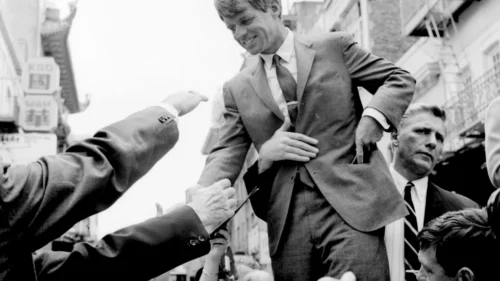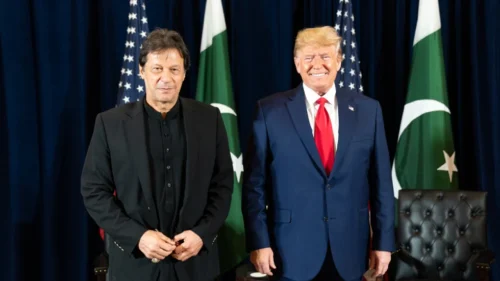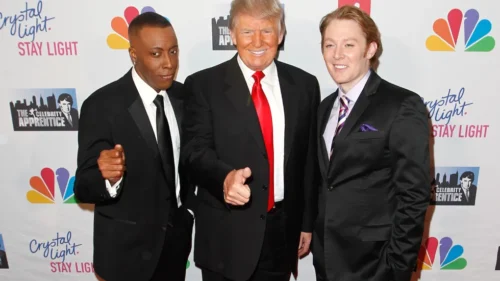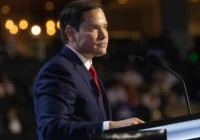In one month, the United States will undergo another one of its regularly programmed national psychodramas: a presidential election. It’s a mix of three p’s: personality, policy and power, with a strong emphasis on personality as the key to defining power. Focused on emotions alone, very few people appreciate the profound effect a presidential campaign can have on the fostering of literary creativity, and specifically the art of fiction.
The idea of electing a new “commander in chief” who will be the “leader of the free world” lifts people out of their boring routine. The actual political effect of the choice between a Democrat and Republican has never been clearly established. But because the emotional stakes are so high, the media have come to characterize every presidential election as existential. If the wrong candidate wins, democracy will disappear.
Along with the fabricated drama of existential stakes, every presidential campaign brings with it a great leap forward in the art of fiction. We used to wonder who might write “the great American novel,” a term so consecrated that it even merits an acronym: GAN. But of course, not many people have time to read novels these days, especially not “great” ones.
Who needs well-crafted literary masterpieces when the most compelling, thunderously suspenseful fiction appears regularly every four years in the drama of a presidential election? Whether its Haitian immigrants purloining pets and serving them for dinner or proclaiming a decade of unmitigated joy, election campaigns extend the range of the substitute for reality we call hyperreality.
Among the plethora of examples, let us consider a US presidential candidate’s foray into historical fiction. Here is how The New York Times summed up the plot of Harris’s historical novel:
“The most important moments in our history have come when we stood up to aggressors like Putin,” Ms. Harris said, warning that the Russian leader would not stop with Ukraine, and would possibly even look into encroaching on NATO territory, if he succeeds in his campaign.”
“History is so clear in reminding us, the United States cannot and should not isolate ourselves from the rest of the world. Isolation is not insulation.”
Today’s Weekly Devil’s Dictionary definition:
Isolation:
In contemporary American English, the undesirable result of any policy that shows a preference for diplomacy over aggressive intervention, peace over the fostering of foreign conflicts conducted by allies with the objective of reinforcing an obsolete notion of hegemony associated with nostalgia for an illusory unipolar world.
Contextual note
The emergence of Donald Trump as a presidential candidate in 2016 confirmed what should already have been obvious: that politics in the US no longer needed a direct connection with reality. At least since Ronald Reagan and the triumph of electoral marketing that turned policy debate into an anecdotal sideshow, presidential campaigns have become a pure exercise in manufacturing something even more fundamental than Noam Chomsky’s and Edward Herman’s consent: hyperreality. On every level — practically for every word in the political vocabulary — the relationship between historical reality and a newly crafted version of it had become artificial if not totally disconnected.
Examples of political hyperreality abound. Trump provided the ultimate demonstration of how pervasive hyperreality could be. Only days after his inauguration, his administration was promoting “alternative facts.” This was hardly new, but it was the first time it would become an object of public debate.
Kamala Harris’s use of “isolation” in the above quote provides a typical example of how the shift towards hyperreality produces its effects. Without being explicit, she appeals to a decontextualized historical meme drawn from a political culture that dates from the decades between the 20th century’s two world wars. The terms “isolationism” and “isolationist” were applied to an attitude spawned by the will to distance the US from any implication in the disputes between the waning and endemically belligerent European colonial powers. The US had very recently itself emerged as an active and rising colonial power thanks to its acquisitions that followed the 1898 Spanish–American war.
The people later vilified as “isolationists” have been blamed for impeding the US from challenging Adolf Hitler and other despots. They had developed an understandable distaste for getting involved in Europe’s internal quarrels. That, of course, changed after the “day of infamy” in which the Japanese attacked not only Hawaii but also the Philippines, Guam and British-controlled Singapore, Hong Kong and Malaya. The US was about to take its first steps as the future policeman of a world order that would emerge after the defeat of Germany and Japan.
One possible reading of the three major dramas of this month’s headlines — whether it’s next month’s election, the nearly three-year-old war in Ukraine or the genocidal campaign that Israel has extended beyond Gaza to the West Bank and now Lebanon — is that the battles we see emerging on all of these three fronts have one thing in common: They pitch an ill-defined cohort of defenders of the post-World War II 20th century order against an equally ill-defined group of seekers of a new world order that has manifestly become multipolar.
Trump finds himself comically, paradoxically and incomprehensibly sitting among the second camp, even though he has based his appeal on the idea of returning to the past by making “America great again.” Harris has become the empty, substance-deprived symbol of complacent immobility, whose mission is to perpetuate the existing hyperreality. Trump lives in the eternal present. That allows him to constantly invent his own hyperreality. Harris’s, in its continuity with the past, is already on public display.
Historical note
Most people should recognize that the world that preceded and the one that immediately followed World War II had very little in common. Harris displays lazy rhetoric when she applies terms inherited from a century ago to today’s reality. She’s in denial about the shift in meaning that took place over the course of a century. Language evolves. Apparently, politicians’ minds and worldviews don’t.
Harris’s use of the term “isolation” is clearly abusive and disrespectful of history. But it stands as only one among a multitude of examples in the hyperreal framework we now call “democratic politics.” The word “democracy” itself has never been so shamelessly abused. We find ourselves in yet another election year in which politicians and pundits are making the alarming claim that “democracy is on the ballot.” Practically equal numbers of voters on the two sides claim that electing the candidate they oppose will constitute a “threat to democracy.”
But do they have any idea of what the democracy is they’re referring to? Do they believe the notion inherited from the Greeks, which was less than wholeheartedly promoted by their nation’s founders, has any precise meaning concerning the reality of governance? Is democracy no more than observing the ritual of repetitive elections? James Madison and Alexander Hamilton thought of democracy as mob rule, whereas Thomas Jefferson maintained that “the will of the people should prevail.” Who won that debate? Apparently, the word “democracy” won, but there is little indication that any discernible concept prevailed.
And, by the way, is there anyone willing to debate it today? Does democracy even have an accepted meaning today? If so, how does it square with the findings of a Princeton study from 2014, which demonstrated with solid statistics that almost all significant policies are determined not by the people, but by an ill-defined, unelected but clearly powerful elite?
The NYT’s article contains another significant quote, this time from Morgan Finkelstein, the Harris campaign’s national security spokeswoman: “Vice President Harris understands that the American people stand on the side of freedom, democracy and rule of law. She knows that if America walks away from Ukraine, Putin would be sitting in Kyiv with his eyes on the rest of Europe and our NATO allies.”
Can anyone honestly make the case that Ukraine provides an example of “freedom, democracy and rule of law?” The classic characterization of Putin as a new Russian Napoleon would be laughable to anyone observing events, mainly because of an utter lack of evidence in favor of it. But it is clearly established as a dogma of the reigning credo of hyperreality.
All this tends to demonstrate one thing: that a truly descriptive definition of democracy as it’s practiced today should be:
A political regime in which ambitious individuals can rise to a position of political power thanks to their “freedom” to distort the truth.
Harris and Trump are coming from different places but are playing the same game, though each has a different set of hyperreal rules. Trump invented his own. Harris sticks to house rules.
*[In the age of Oscar Wilde and Mark Twain, another American wit, the journalist Ambrose Bierce produced a series of satirical definitions of commonly used terms, throwing light on their hidden meanings in real discourse. Bierce eventually collected and published them as a book, The Devil’s Dictionary, in 1911. We have shamelessly appropriated his title in the interest of continuing his wholesome pedagogical effort to enlighten generations of readers of the news. Read more of Fair Observer Devil’s Dictionary.]
[Lee Thompson-Kolar edited this piece.]
The views expressed in this article are the author’s own and do not necessarily reflect Fair Observer’s editorial policy.
Support Fair Observer
We rely on your support for our independence, diversity and quality.
For more than 10 years, Fair Observer has been free, fair and independent. No billionaire owns us, no advertisers control us. We are a reader-supported nonprofit. Unlike many other publications, we keep our content free for readers regardless of where they live or whether they can afford to pay. We have no paywalls and no ads.
In the post-truth era of fake news, echo chambers and filter bubbles, we publish a plurality of perspectives from around the world. Anyone can publish with us, but everyone goes through a rigorous editorial process. So, you get fact-checked, well-reasoned content instead of noise.
We publish 3,000+ voices from 90+ countries. We also conduct education and training programs
on subjects ranging from digital media and journalism to writing and critical thinking. This
doesn’t come cheap. Servers, editors, trainers and web developers cost
money.
Please consider supporting us on a regular basis as a recurring donor or a
sustaining member.
Will you support FO’s journalism?
We rely on your support for our independence, diversity and quality.











Comment